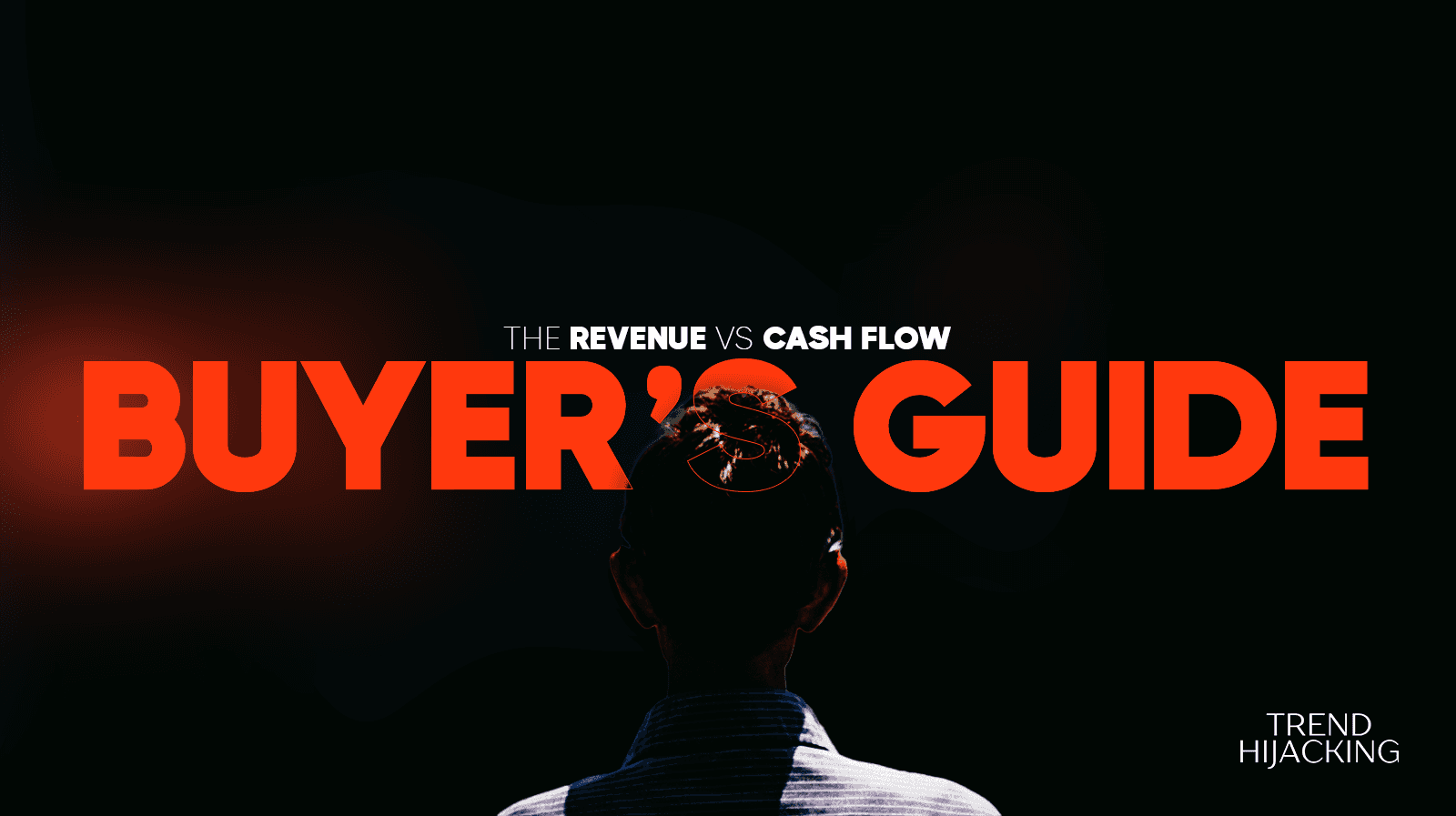Key Legal Steps For Selling An E-Commerce Business In 2026
1. Organize Your Business Structure and Documents

Before you even list your e-commerce business for sale, make sure all your legal documents are in order.
This includes your business registration, tax records, contracts, and licenses. Buyers want to see that your business is legitimate and compliant.
If your business is a corporation or an LLC, confirm that your filings are up to date.
For sole proprietorships, make sure you gather your tax returns for the past three years.
A 2022 report by BizBuySell points out that up to 73% of buyers usually request detailed financial and legal documentation before making an offer.
Having your paperwork organized shows professionalism and reduces the chance of disputes.
Check out this post on how buyers conduct due diligence for e-commerce stores.
Sell Your E-Commerce Business Fast
At TrendHijacking, we help you connect with serious investors who are ready to buy e-commerce businesses like yours.
We check all the numbers and present your business in the best light. Our pre-vetted buyers skip the “is this real?” stage, so you can get a better price and close faster.
Submit your business details today and make selling simpler, faster, and more profitable.
2. Conduct A Legal Audit

A legal audit means a review of your business to identify potential problems.
You or a lawyer should check contracts with suppliers, employees, and service providers.
Ensure that there are no outstanding debts, unresolved disputes, or intellectual property issues.
For e-commerce businesses, this also means checking your website, product listings, and trademarks.
If you sell branded products, verify that you have the rights to sell them.
While a legal audit may feel tedious, it can help prevent last-minute surprises that could kill a sale.
3. Draft A Non-Disclosure Agreement (NDA)

Before you share sensitive information with potential buyers, always use an NDA.
This agreement ensures buyers cannot leak your business data, such as revenue numbers, supplier contacts, or customer lists.
NDAs are standard in business sales. Without one, you risk giving away valuable information to competitors or opportunists.
4. Prepare A Letter of Intent (LOI)

Once you find a serious buyer, you’ll usually sign a Letter of Intent.
This is a non-binding document that outlines the main terms of the deal, like the purchase price, payment terms, and timeline.
An LOI protects both parties. It makes sure everyone is on the same page before you spend time drafting a formal sales agreement.
While not legally binding in most areas, it creates a written record of your negotiations, which can help avoid misunderstandings.
Related: 7 Key Documents To Request When Buying A Business
5. Draft the Purchase Agreement

The purchase agreement is the legal contract that finalizes the sale. This document should cover the following KEY areas:
The sale price and payment method
What assets are included (website, inventory, social media accounts, customer lists, etc.)
Any liabilities the buyer is assuming
Non-compete clauses
Representations and warranties (statements about the business’s condition)
Hiring a lawyer experienced in e-commerce business sales is crucial.
According to LegalZoom, a properly drafted purchase agreement greatly reduces the risk of post-sale lawsuits or disputes.
Don’t skip this step, even if you think your buyer is trustworthy.
Sell Your E-Commerce Business Fast
At TrendHijacking, we help you connect with serious investors who are ready to buy e-commerce businesses like yours.
We check all the numbers and present your business in the best light. Our pre-vetted buyers skip the “is this real?” stage, so you can get a better price and close faster.
Submit your business details today and make selling simpler, faster, and more profitable.
6. Handle Intellectual Property Transfers

Intellectual property (IP) is often the most valuable part of an online business.
This includes your domain name, logo, product designs, software, and trademarks.
You must legally transfer IP rights to the buyer.
This can involve signing separate assignment agreements or updating registrations with the U.S. Patent and Trademark Office.
Without proper IP transfer, the buyer could have legal trouble using the assets, and you might still be liable for claims related to the business.
7. Notify Employees and Contractors

If the e-commerce business you’re selling has employees, independent contractors, or service providers, make sure you comply with employment laws during the sale.
Depending on your agreements, you may need to do the following:
Notify employees of the change in ownership
Transfer contracts or benefits
Pay outstanding wages or commissions
Failing to do this can create legal liability for you even after the sale.
The U.S. Department of Labor provides guidelines for employee transitions in business sales, which can help you stay compliant.
8. Pay Taxes and Close Financial Accounts

Selling a business in general has tax implications.
You may owe capital gains tax on the sale, and the way you structure the sale (asset sale vs. stock sale) affects how much you pay.
Consulting a tax professional is essential here.
Also, close or transfer business bank accounts, merchant accounts, and payment gateways to prevent unauthorized transactions.
According to IRS guidance, proper tax reporting ensures you avoid fines or audits later.
9. Keep Records After the Sale

Based on our 5+ years of experience buying and selling e-commerce businesses at TrendHijacking, we always have this important piece of advice for sellers:
After closing the deal, we advise you to keep copies of all contracts, tax filings, and correspondence.
You may need them if a buyer raises disputes or if the IRS audits the sale. Digital and physical backups are both important.
Keeping records doesn’t just protect you legally; it also helps if you ever start another business and need references or proof of previous sales.
Related: How To Sell An Online Business In 2026 (9 Little-Known Steps)
Legal Mistakes Sellers Make When Selling an E-Commerce Business

Even if you follow all the main legal steps we’ve discussed above, it’s still easy to slip up.
Small mistakes can cost you money, slow down the sale, or even create legal headaches after the deal closes.
Here’s a list of the most common legal mistakes e-commerce sellers make and how to avoid them:
#1. Not Organizing Business Documents
Many sellers start a sale without complete financial statements, contracts, or tax records. Missing documents can scare buyers and lower offers.
#2. Skipping a Legal Audit
Ignoring potential legal issues (e.g. like unpaid invoices, disputes, or intellectual property conflicts) can lead to post-sale lawsuits or deal cancellations.
#3. Sharing Sensitive Data Without an NDA
Some sellers give buyers access to revenue numbers or supplier lists too early. Without an NDA, this information could be used against you.
#4. Using an Incomplete or Verbal Purchase Agreement
A vague agreement may leave room for disputes over what’s included in the sale, payment terms, or liabilities.
#5. Failing to Transfer Intellectual Property Properly
You should also keep in mind that selling your e-commerce business without transferring domain names, trademarks, or copyrights can create legal headaches for both parties.
#6. Ignoring Employee or Contractor Obligations
Not handling employee notifications, contracts, or benefits can make you liable for unpaid wages or violations after the sale.
#7. Misunderstanding Tax Implications
Many sellers fail to plan for capital gains tax or the tax consequences of an asset vs. stock sale, leading to unexpected tax bills.
#8. Not Updating Licenses and Permits
Some businesses forget to transfer or close permits, business registrations, or vendor accounts, which can cause regulatory issues.
#8. Overlooking Buyer Representations and Warranties
Not including representations in the purchase agreement (like confirming ownership of assets or accuracy of revenue) can make it harder to enforce the contract if problems arise.
#9. Discarding Records Too Early
Some sellers assume the sale ends the legal responsibility. Keeping contracts, emails, and financial documents for at least 5–7 years is important for audits or disputes.
Legal Steps For Selling An E-Commerce Business FAQs:
Here are helpful answers to the commonly asked questions related to the legal steps for selling an e-commerce business:
1. How do I sell my e-commerce business?
To sell your e-commerce business, you should start by organizing your financial and legal documents, then find serious buyers. Use NDAs, draft a Letter of Intent, and finalize the sale with a purchase agreement.
Transfer assets, intellectual property, and any contracts, while handling taxes and employee obligations to ensure a smooth, legally compliant transaction.
2. What are the legal requirements for an online business?
Legal requirements for an online business include registering your business structure, obtaining necessary licenses or permits, complying with tax obligations, following consumer protection laws, protecting intellectual property, and drafting contracts with suppliers, employees, and partners.
You must also ensure privacy policies, terms of service, and e-commerce regulations are in place.
Related: How Long Does It Typically Take To Sell An Online Store?
Final Words
Taking the right legal steps when selling your e-commerce business helps protect your money, your reputation, and the buyer’s investment.
Key steps include organizing documents, conducting a legal audit, using NDAs and LOIs, drafting a purchase agreement, transferring IP, handling employee issues, and paying taxes.
Above all, be sure to keep all the records safe.
Follow these steps, and you will reduce the risk and make the business sale smoother for everyone involved.
Remember that a careful legal approach can increase your business’s value, attract serious buyers, and give you confidence that the sale will go as planned.
Connect With Serious Buyers for Your E-Commerce Business
You’ve built a profitable e-commerce business. And now it’s time to sell it to the right buyer.
At Trend Hijacking, we introduce e-commerce business owners to acquisition-ready buyers who are actively looking for businesses like yours.
To get started, simply submit your business details today and start connecting with buyers who are serious about making a fair, timely offer.
Your information remains completely private, and we’ll respond within 48 hours.
A Done-For-You E-commerce Business
Discover how we Build, Launch, and Scale a 6-figure/month Business for You
Learn more
The 6-Step Blueprint to E-Commerce Acquisition
See how we Acquire, Convert, and Scale with Real Case Studies to Prove It.




















